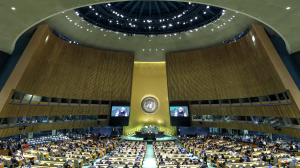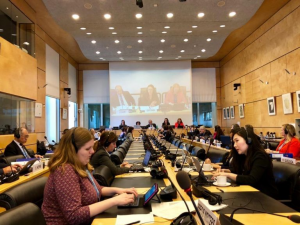By Leila Nasr

Many UN seats were left empty as the UNGA general debate moved online on September 22, 2020. Credit: Justine Lane/EPA
Last month, for the first time in its 75-year history, the United Nations (UN) General Assembly met virtually for its annual “general debate”. But despite the name, there was no ‘debate’ to be found. Instead, what transpired was a series of monologues by global leaders who addressed the assembly through pre-recorded fifteen-minute messages from their home states. More so than normal, many leaders used these one-way addresses as opportunities for political grandstanding and populist pandering to their political bases back home, rather than highlighting ways for greater cooperation during these difficult times.
Such is the nature of UN diplomacy in the era of COVID-19 – distant, impersonal and devoid of real dialogue that has allowed the UN to play a central role in global peacebuilding. At the very least, the online format has revealed some of the UN’s most pressing access and equity challenges. For instance, during last month’s general debate, commentators observed how the online format laid bare the gender inequality among state representatives. As one writer quipped: “Welcome to woman-free Tuesday”, referring to the string of 52 male speakers who addressed the virtual gathering on September 22, 2020 before a single woman was heard.
The challenges of transitioning UN operations online extend beyond the General Assembly, affecting treaty bodies, commissions, and expert mechanisms. The UN Human Rights Committee (the Committee), which monitors compliance with the International Covenant on Civil and Political Rights (ICCPR), is no exception. In previous years, Allard’s International Justice and Human Rights (IJHR) clinicians working on the HRC Team have had the chance to see the Committee’s inner-workings while travelling to Geneva to assist during the March sitting. Since this past summer, things have been looking a little different; due to the Covid-19 pandemic, the 129th session in July 2020 was entirely online, and the 130th session in October-November 2020 will be also. It is likely the HRC Team’s work will be fully online for the 2020-2021 year.

Former IJHR Clinicians attend the UN HRC review of Estonia in Geneva in March 2019. Pictured: Student Inggrid Wibowo (right)
For Committee members, rights advocates and IJHR clinicians alike, this new environment presents both challenges and opportunities. The most significant challenge is that, once again, all constructive dialogues with states have been postponed indefinitely due to the difficulties involved in conducting them virtually. Constructive dialogues allow member States to outline the progress they have made in complying with the ICCPR and receive expert advice on how to comply with their international human rights commitments as the Committee reviews their reports. This process fosters accountability and transparency and is one of the core activities of the Committee when it meets for state reviews three times each year. Without these crucial sessions, some rights advocates worry a ‘protection gap’ will emerge for those most vulnerable to rights abuses, with states feeling less external pressure to fulfil their human rights obligations due to the lack of direct dialogue and review.
While the HRC has attempted to mitigate the protection gap by carrying on with its other work, virtual meetings for Treaty Bodies like the HRC come with their own challenges. These include the reliability and accessibility of technology (especially for persons with disabilities for whom online engagement may involve unique challenges); poor internet connectivity (particularly for treaty body members and representatives joining virtual sessions from places with low-bandwidth); navigating UN and external video conferencing platforms; the (un)availability of simultaneous language interpretation for many online sessions; and scheduling workable times for meetings across diverse time zones. Finally, due to the cancellation of the state party dialogues which are public, many of the remaining tasks to be undertaken by the Committee will be held in closed sessions. There will be no live broadcast of most of the Committee meetings as there typically is. For advocates and individuals, this will produce little to no sense of transparency, or of justice being done for victims of human rights abuses – a key pillar of the Committee’s work.
Nevertheless, there are a few positive aspects to the shift to online work. For example, the online format may encourage greater use of written communications between members prior to and during the Committee meetings for the purposes of commenting on certain drafts and deciding on issues other than the state party dialogues. This could be an efficient method for ensuring that the Committee is able to cover everything in the time allotted, as members would already have had some online discussion and the in-person meeting can be reserved for contentious issues requiring extra time. This could also allow the Committee to spend more time working through its backlog of individual communications. Another positive aspect may be that online sessions are significantly less costly than in-person meetings, and could even help the UN combat climate change by reducing the carbon footprint of its meetings. The virtual format may also allow for greater participation by non-governmental organizations, think tanks, academics and advocacy groups for whom the financial impact of travelling to Geneva has been prohibitive. However, the legitimate concerns about access discussed above, apply here as well
Overall, the use of technology may facilitate online sessions for now, but this is only a short-term solution. Like most UN bodies, the HRC relies heavily on in-person dialogue for generating the kind of trust, accountability and transparency that ultimately encourages states to meet their human rights obligations. Without these face-to-face meetings, dangerous protection gaps could emerge for the most vulnerable around the world while rights violators may not face sufficient scrutiny for their actions.
Leila Nasr is a 2L student at the Peter A. Allard School of Law, and is working with the IJHR Clinic as part of the HRC Team.